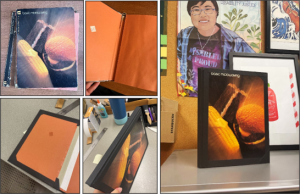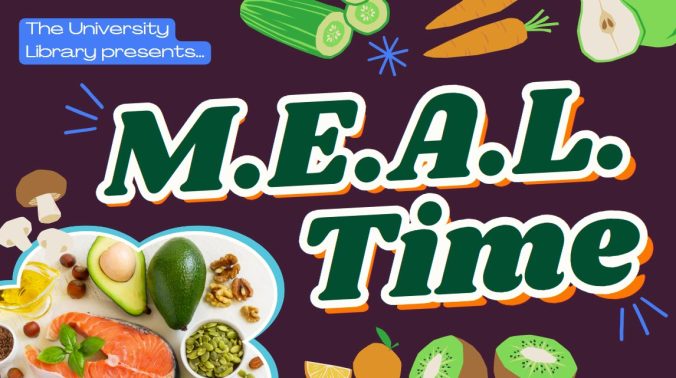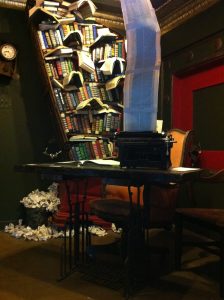REPAIR Lab is where the books, CDs, DVDs, maps, sheet music, pamphlets, periodicals, and any other physical formats you can possibly imagine exists in an academic library will come to when it begins to feel broken, unseen, misidentified, and neglected. REPAIR Lab student employees use tools such as glues, tapes, and presses to reassemble broken pieces back into book shape. The first time a student used a new book press, they over cranked and the stacked books shot out the other side in an avalanche of books and boards. The first thing a student said is, “You’re sooooo cooked!” Another followed up with, “Yup. Ate it.” When a student finally mastered the nuance of upcycling old manila folders to make new book spines, they are rewarded with friendly hassling, “Hey, look at you! You’re finally cooking!” This inevitably is followed by food talk and how hard it is to cook as a college student.
Cooking talk is a near constant stream of conversation in the REPAIR Lab. I have learned to be “cooked” is bad. “To cook” is contextually neutral, but “cooking” means everything is flowing well. My students will say they are cooked because they cannot cook. They never learned how. One of my students repaired a cookbook and gifted it to the Asian Pacific Islander Student Center to help students make meals in a microwave.

A repaired microwave cookbook for the Asian Pacific Islander Student Center. (Photos from @bookoni)
Or they are highly limited in what they can cook because they do not drive and therefore have few opportunities to get to a grocery store. Our campus is W. K. Kellogg’s (yes, the cereal mogul Kellogg) former Arabian horse ranch. If it was not for the fact, the northern edge of campus butts up against Interstate 10, it could almost be mistaken for a school in the countryside.
The situation is also exacerbated by an increase of students suffering from food insecurity. To address the problem of food insecurity, the University has a pantry students can access during weekday business hours. For our students in the REPAIR Lab, we have a bin of dry and canned pantry basics like pasta sauce, vegetables, and boxed macaroni cheese. There is another locker for grab-and-go snacks. These are small measures that help a small percentage of students. Our University Library is currently in the middle of a dean search. Once a permanent dean is found, I would like to propose that our library explore collaborating with Poly Pantry to have a location inside the library. The library is open far longer and is utilized by thousands of students a day, so having a secondary location inside the library and possibly a vending machine as a tertiary location outside the library would have a larger impact. The library is the heart of the campus. Nourishing our students with food so they can have the energy to nourish their minds sounds like an excellent idea to me.
This year our library purchased cookbooks with titles like 5-minute Japanese Noodles Cookbook, Everything College Cookbook: 300 Easy and Budget-friendly Recipes for Beginner Cooks, and How-to Cookbook for College: Easy Recipes and Simple Techniques for Healthy Eating. Beyond cookbooks, I think it would be interesting for the Library to explore mobile culinary literacy programs like Camden County Library System’s (New Jersey) Books and Cooks’ mobile kitchen. Our campus has a food truck, smaller express-type food trucks, a hospitality school, a farm store, orchards, and greenhouses. I collaboration between these campus departments and the library to teach and demonstrate healthy cooking, substitution options, and easy-to-make recipes would be a sight. We could get cooking out on the Library patio and at dormitories.
I think another interesting program is the Edible Alphabet program offered by the Free Library of Philadelphia. In that program, students learn vocabulary and grammar while practicing cooking a recipe! Our university is home to students from all over the world with rich food traditions. If it were possible to borrow a food truck, the Library could collaborate with language learning courses or co-curricular groups to demonstrate a recipe that celebrates the heritage of each of our campus groups. I think it would be fun to have the Care Center bring the daycare children to the Library’s Bronco Family Space for a cooking lesson that emphasizes child appropriate recipes.
The ideas are many. The logistics may be difficult, but if we don’t explore, we might just be cooked. To avoid that, I think it’s time for the University Library to try a new model of collaboration…let’s get cooking!
Resources:
Ewen, Lara. (2018, September 4). A movable feast: Libraries use mobile kitchens to teach food literacy. American Libraries. https://americanlibrariesmagazine.org/2018/09/04/movable-feast-library-mobile-kitchens/
Free Library of Philadephia. (2025). Edible Alphabet. https://libwww.freelibrary.org/programs/edible-alphabet


